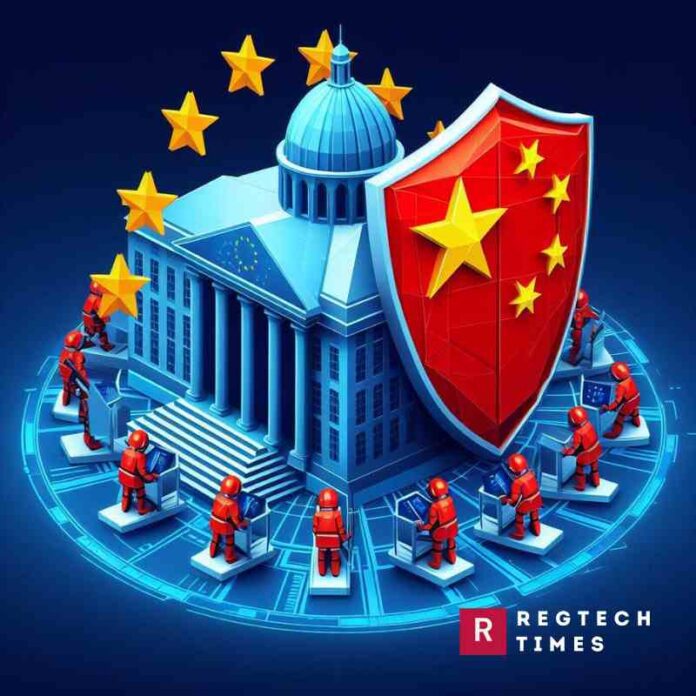In the rapidly evolving digital age, the protection of sensitive research and intellectual property has become a global concern. The European Union (EU), a significant player in the global technology landscape, is taking proactive steps to shield its technological research from Chinese Espionage. EU is making efforts on unprecedented University-Intelligence collaboration.
University-Intelligence Collaboration
The EU is no exception in the race to protect technological advancements. It is taking significant steps to shield its technological research from foreign interference, particularly from China. This move is not just a reaction to the current geopolitical climate but a strategic decision to ensure the EU’s technological sovereignty and economic competitiveness in the future.
Focus on Sensitive Technologies
The EU’s primary focus is on securing research in sensitive technology areas such as microchips, quantum computing, biotechnology, and artificial intelligence. These technologies are the pillars of the future digital economy, and their protection is crucial for maintaining the EU’s competitive edge. The EU recognizes that these technologies have the potential to revolutionize various sectors, from healthcare to transportation, and hence, the need to protect them from foreign interference.
The dual-use nature of much academic research—where civilian advancements can have military applications—amplifies these concerns.
Steps Towards Security
To achieve this, the EU is urging researchers to secure their work against foreign interference and Espionage Activities. This call to action is not just a recommendation but a necessity in today’s interconnected world where intellectual property theft and technology leakage are emerging risks. The EU is committed to providing researchers with the necessary tools and resources to protect their work, including access to the latest cybersecurity measures and training in data protection.UK’s Spy Chief Furious Over China’s Coercive Cyber Threats, Condemns Russia’s Espionage PracticesPoland Uncovers Sinister Russian Spy Ring Amidst European Espionage Crisis, 9 Arrested
University-Intelligence Collaboration
One of the significant steps the EU is taking is fostering a direct line of communication under the University-Intelligence Collaboration. This move is unprecedented but necessary given the gravity of the situation. Regular classified and non-classified briefings are planned, and “liaison officers” will be appointed to help universities combat foreign snooping. This initiative aims to create a culture of security awareness within universities and ensure that researchers are equipped to protect their work.
The China Factor
The EU’s concerns primarily stem from the increasing presence of Chinese students and academics at European universities and collaborations between European universities and Chinese research institutes. While international collaboration is a cornerstone of academic research, it also opens up avenues for potential technology leakage.Chinese Attempts at Espionage failed in the Swiss AlpsChinese students, often enrolled in advanced science and technology programs, are suspected of covertly collecting sensitive research and technological innovations to send back to China. This practice not only undermines the intellectual property rights of the universities but also poses a significant risk to national security, as critical information related to defence and infrastructure could be compromised.The EU is keen on maintaining its open academic environment while ensuring that it does not compromise its technological advancements.
Recommendations and Responses
To address this, the EU is recommending that national governments allow their university-intelligence collaboration to strengthen the coordination. This coordination will enable universities to understand the risks associated with foreign involvement in their scientific research better and take appropriate measures to mitigate them.Universities, for their part, are open to this idea. They are willing to engage in discussions with intelligence agencies to learn more about the potential risks and how to safeguard their research. This openness signifies a shift in the academic landscape where the need for University-Intelligence is being recognized and acted upon.
Conclusion
In conclusion, the EU’s efforts to protect its technological research signify a new era of university-intelligence collaboration. While this move may raise questions about academic freedom, it is a necessary step in today’s world where the line between academic research and national security is increasingly blurred. As we move forward, it will be interesting to see how this dynamic evolves and what it means for the future of academic research in the EU. The EU’s approach could serve as a model for other nations grappling with similar challenges, thereby shaping the global discourse on the intersection of academia, technology, and national security.


